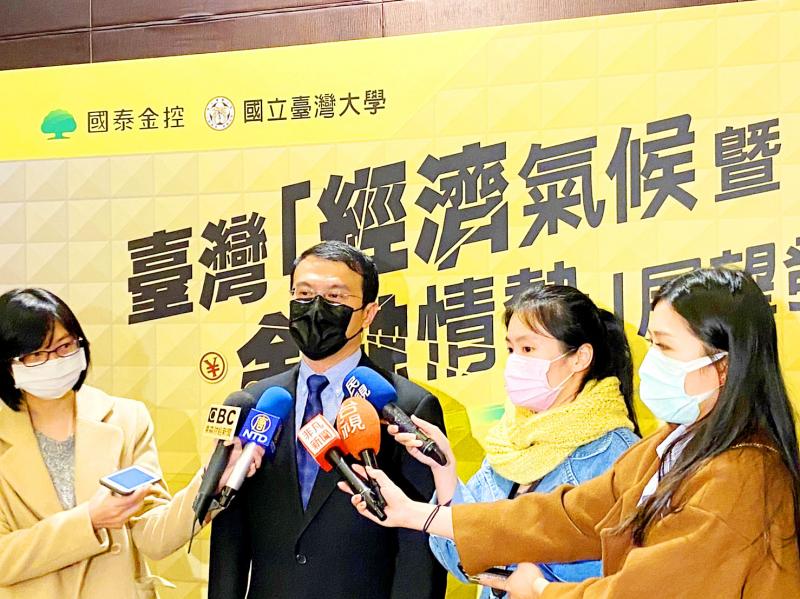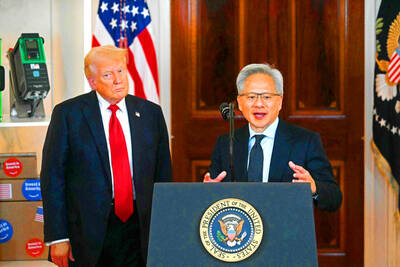Cathay Financial Holding Co (國泰金控) yesterday raised its forecast for Taiwan’s GDP growth to 2.4 percent this year and 3.2 percent next year, saying that the economy at home is improving, as is the global situation, although more time is needed for the nation to reach pre-COVID-19 pandemic levels.
Cathay Financial’s previous projections were 1.7 percent for this year and 2.9 percent for next year.
Despite the expected improvement, Cathay Financial — the nation’s largest financial institution by market value — agreed with international research bodies that the global economy needs more time to recover to pre-pandemic levels, citing economic reports for this and next year.

Photo: Allen Wu, Taipei Times
“That view accounted for our relatively conservative forecast,” said National Central University professor of economics Hsu Chih-chiang (徐之強), who heads a research team commissioned by Cathay Financial.
The Directorate-General of Budget, Accounting and Statistics, the central bank and Academia Sinica have more optimistic projections for growth next year of 3.68 percent, 3.83 percent and 4.24 percent respectively, Hsu said.
Taiwanese firms would continue to benefit from strong demand for new technology applications and devices required to maintain a low-contact economy in the next six months, he said.
People around the world are being given COVID-19 vaccines, which might enable economic activity to return to normal, he said.
The situation is favorable for global trade flows, allowing exports and imports next year to expand 4.33 percent and 4.4 percent respectively, Hsu said.
Private consumption might increase 3.8 percent after floundering in negative territory this year, he said.
Travel restrictions have caused havoc for GDP, despite the government’s Triple Stimulus Voucher program and a boom in domestic tourism, he said, adding that international travel is expected to begin recovering slowly in the second half of next year.
Private investment is forecast to increase 2.5 percent next year, slower than the government’s projected 3.19 percent gain, he said, adding that demand for technology products would lose steam if things return to normal.
Major central banks would stand by loose monetary policies to support economic growth in the next two years and Taiwan would follow suit, although it has held firm so far, Hsu said.
Easing monetary policies would support financial assets, as seen in liquidity-driven rallies across global bourses, he said, adding that a recent sentiment survey showed risk appetite among local investors reached a 10-year high.
Still, the pandemic, deteriorating government debts and US-China trade tensions pose uncertainties to recovery, he said.

Taiwan Semiconductor Manufacturing Co (TSMC, 台積電) last week recorded an increase in the number of shareholders to the highest in almost eight months, despite its share price falling 3.38 percent from the previous week, Taiwan Stock Exchange data released on Saturday showed. As of Friday, TSMC had 1.88 million shareholders, the most since the week of April 25 and an increase of 31,870 from the previous week, the data showed. The number of shareholders jumped despite a drop of NT$50 (US$1.59), or 3.38 percent, in TSMC’s share price from a week earlier to NT$1,430, as investors took profits from their earlier gains

AI TALENT: No financial details were released about the deal, in which top Groq executives, including its CEO, would join Nvidia to help advance the technology Nvidia Corp has agreed to a licensing deal with artificial intelligence (AI) start-up Groq, furthering its investments in companies connected to the AI boom and gaining the right to add a new type of technology to its products. The world’s largest publicly traded company has paid for the right to use Groq’s technology and is to integrate its chip design into future products. Some of the start-up’s executives are leaving to join Nvidia to help with that effort, the companies said. Groq would continue as an independent company with a new chief executive, it said on Wednesday in a post on its Web

CHINA RIVAL: The chips are positioned to compete with Nvidia’s Hopper and Blackwell products and would enable clusters connecting more than 100,000 chips Moore Threads Technology Co (摩爾線程) introduced a new generation of chips aimed at reducing artificial intelligence (AI) developers’ dependence on Nvidia Corp’s hardware, just weeks after pulling off one of the most successful Chinese initial public offerings (IPOs) in years. “These products will significantly enhance world-class computing speed and capabilities that all developers aspire to,” Moore Threads CEO Zhang Jianzhong (張建中), a former Nvidia executive, said on Saturday at a company event in Beijing. “We hope they can meet the needs of more developers in China so that you no longer need to wait for advanced foreign products.” Chinese chipmakers are in

POLICY REVERSAL: The decision to allow sales of Nvidia’s H200 chips to China came after years of tightening controls and has drawn objections among some Republicans US House Republicans are calling for arms-sale-style congressional oversight of artificial intelligence (AI) chip exports as US President Donald Trump’s administration moves to approve licenses for Nvidia Corp to ship its H200 processor to China. US Representative Brian Mast, the Republican chairman of the US House Committee on Foreign Affairs, which oversees export controls, on Friday introduced a bill dubbed the AI Overwatch Act that would require the US Congress to be notified of AI chips sales to adversaries. Any processors equal to or higher in capabilities than Nvidia’s H20 would be subject to oversight, the draft bill says. Lawmakers would have